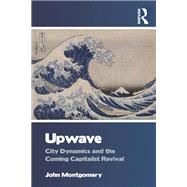Upwave
, by John Montgomery- ISBN: 9781409422273 | 1409422275
- Cover: Nonspecific Binding
- Copyright: 2/17/2016
Countering the many claims that the best days of capitalism are over following the economic meltdown of 2008 onwards, this book provocatively argues that a new golden age of capitalism - or upwave - began around 2002, and despite the unstable markets in the western world of the past few years, this upwave will produce previously unseen levels of wealth creation during the next 20 years. This theory is based on the commercialisation of new technologies, from which new services and products have been derived, combined with new markets opening up in China, India, Brazil and Russia. The book claims that these positive trends will not only affect these new markets, but will enable established markets to recover, albeit sluggishly in the US, UK and Europe. The book explains why the so-called 'Global Financial Crisis' was an old-fashioned banking panic. Although it made the recession much deeper than one would expect, the real problem all along was toxic debt in the banking sector. Once this is dealt with, Montgomery argues that capitalism will recover quickly as the pre-recession patterns of trade return. The major problem now facing some Western economies is not recession but government debt, brought about by over-spending and panic stimulus measures. The book goes on to argue that orthodox economic theory - namely Monetary policy on interest rates, Keynesianism and neoclassical econometrics are poor tools in helping our understanding of how economies work, let alone attempt 'economic management'. It reasons that this is because economies are open-ended systems, highly flexible and adaptive and make themselves up as they go. The secret to wealth creation remains innovation, entrepreneurship and private investment. Governments do not create wealth by fiddling about with interest rates or introducing lavish welfare programmes. But they can thwart wealth creation by over-spending, over-taxing and exporting skilled people, investors and innovative businesses. Economies also grow and develop in real places rather than within - largely artificial - nation-state boundaries. So-called 'national economies' are in fact an amalgam of propulsive, dynamic cities and city-regions, resource regions and laggard regions (such as Wales or South Australia). Governments seeking to grow economies, must pay attention to and support growth regions and 'creative milieux'. The book concludes with a discussion of phases along the coming upwave, including such matters as economic policy, property booms and democratic freedoms. It warns against a coming 'Fiscal Crisis of the State' in the USA, the UK and perhaps Australia. It also argues that capitalism is a good thing and is here to stay.






